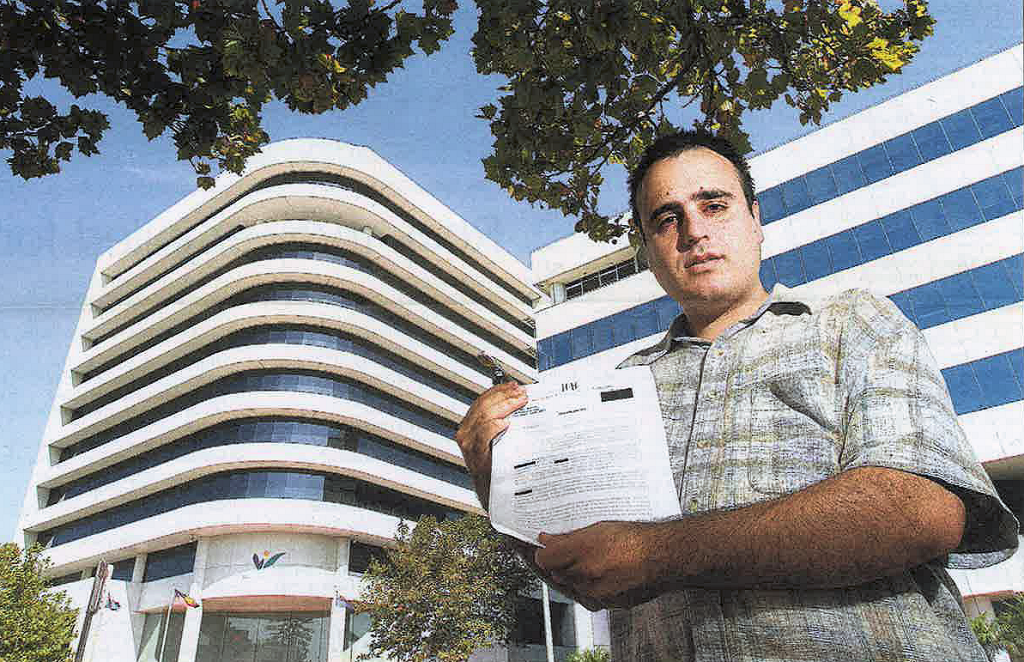
Former Wollongong councillor Andrew Anthony pictured yesterday with the reply he received from ICAC. Picture: KIRK GILMOUR
ICAC failed to act on councillor’s complaints
Sacked Wollongong councillor Andrew Anthony wrote to the Independent Commission Against Corruption more than three years ago to blow the whistle on council planning processes, including cosy relationships between developers and councillors.
The corruption watchdog responded on December 2, 2005, saying his complaints did not appear to involve serious and systemic corrupt conduct and that it did not intend pursuing the matter.
Yesterday, Mr Anthony told the Mercury he decided to break his self-imposed silence in light of the dramatic events which unfolded at ICAC’s public inquiry in recent weeks.
“It’s also to let the people out there accusing independent councillors of doing nothing about what has been revealed by ICAC that some of us did try,” Mr Anthony said.
He revealed he had made two anonymous telephone calls to ICAC a few months before writing and signing his letter of complaint on November 2.
In the letter he made three specific allegations.
The first was that he and friends had witnessed a Labor councillor have a number of meals with a developer whose project the councillor later voted to approve and that the same developer had made significant donations to the Labor Party.
Mr Anthony said he did not want to make public the identity of the councillor, but said he was one of the four identified by ICAC Commissioner Jerrold Cripps as being at the heart of systemic corruption within council before his decision to recommend the council’s sacking.
Nor would he reveal the identity of the developer, who he said was not named at ICAC’s inquiry.
ICAC’s response was: “Councillors may vote on matters in which they have a non-pecuniary conflict of interest. Further, councillors may meet with developers and receive political donations.”
ICAC advised Mr Anthony that he could raise the matter with Rod Oxley, council’s general manager at the time, if the councillor failed to declare his interest in the matter.
Mr Anthony says he did not do so.
His second complaint involved an assertion that the council in early 2005 had ignored community opposition to a proposed subdivision.
ICAC said it did not consider this complaint corrupt conduct.
Mr Anthony’s third complaint, that he had been the subject of repeated threats from Labor councillors and that he feared for his safety, was a matter ICAC believed could be dealt with through the council’s Code of Conduct as a disciplinary matter.
This complaint was not referred by ICAC to council because Mr Anthony did not consent to the disclosure of his identity.
After a brief outline of the definition of corruption as defined under the Act, the ICAC assessment officer concluded his letter: “As the matter does not appear to involve serious and systemic corrupt behaviour, the ICAC does not intend to pursue the matter.
“The matter will now be referred to the Operations Review Committee for its advice as required under the ICAC Act.”
Mr Anthony said his concerns about the “abuse” of planning instruments, like SEPP1 in relation to height and floor space ration restrictions, were shared by other independent councillors at the time.
“It would be easy to say ‘told you so’, but the findings by the commissioner and the subsequent sacking of the council can give no-one any comfort,” Mr Anthony said.
“There were probably many complaints received by ICAC about what was going on, but I hope the concerns I raised may have helped in some way to bring about the investigation.”
